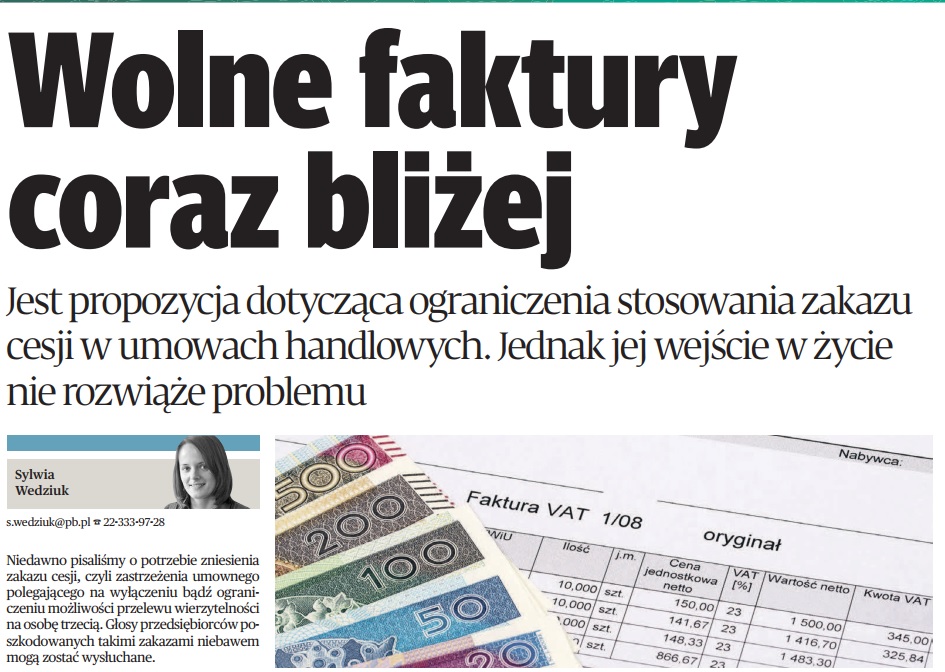Work is underway on a draft amendment that also provides for changes to the Law of March 8, 2013 on Preventing Excessive Delays in Commercial Transactions (the so-called Congestion Law). Article 9a is to be added to the law, which reads: "In commercial transactions, a contractual stipulation prohibiting a creditor from disposing of a claim, as referred to in Article 509 § 1 of the Act of April 23, 1964. - Civil Code, shall become ineffective if payment has not been made within the 90 days From the date specified in the contract.".
The project has been subjected to public consultations.
# PZF Position
The Polish Factors Association filed a position paper in which it indicated, among other things. It pointed out, among other things, that (i) the draft, in its current wording, does not solve the problem of the ban on assignment in professional trade, (ii) the draft is problematic in terms of relations with insurers under full factoring agreements, due to possible disputes over the legal title to the receivables and payment of damages, (iii) the draft is problematic also in terms of non-full factoring agreements, because the solution may make it impossible to effectively and immediately pursue payment of matured receivables from counterparties (factoring customers), (iv) it is reasonable to shorten the period to 30 days, which would protect the client from recourse. At the same time, PZF pointed to an ambiguous provision regarding when the 90-day deadline is calculated from. The consequence of failing to clarify the indicated moment will be the problem of determining when the prohibition of assignment is in force, i.e. indicating the moment from which the prohibition of assignment ceased to be in force, especially in the context of lack of access to commercial contracts and the scale of operations.
The PZF reported the following proposals to change the provisions:
Article 9a. In commercial transactions, a contractual stipulation prohibiting a creditor from disposing of a claim, as referred to in Article 509 § 1 of the Act of April 23, 1964. - Civil Code, shall be ineffective."
Or if the Ministry does not agree with the above:
"In commercial transactions, a contractual stipulation prohibiting a creditor from disposing of a claim, as referred to in Article 509 § 1 of the Act of April 23, 1964. - Civil Code, shall become ineffective if payment is not made within 30 days of the due date indicated on the invoice, and if the due date is not indicated on the invoice then 30 days of the due date under the agreement".
and a proposal to add Article 9b, with the following wording:
Article 9b. In commercial transactions, a contractual stipulation prohibiting the creditor from disposing of claims, as referred to in Article 509 § 1 of the Act of April 23, 1964. - Civil Code, shall be ineffective if the debtor obligated to pay for goods or services is a large entrepreneur, and the creditor is a micro-entrepreneur, small entrepreneur or medium-sized entrepreneur."
A full summary of the PZF's position is available at side of the legislative process.
# ZPF Position.
The Association of Financial Enterprises filed its position on October 12, 2021, indicating, among other things, that (i) it receives numerous signals, particularly from factoring companies, that the institution of contractual prohibition of assignment of monetary receivables is being abused against entrepreneurs (mainly in the SME sector), often even leading to their loss of liquidity and, in turn, to payment congestion and bankruptcies, (ii) the provision in the proposed wording will not solve the problem of the ban on assignment and will not remove payment congestion, (iii) the proposed amendment would therefore only benefit debt collection companies that purchase receivables at a discount for the purpose of collecting them for their own account, although in our opinion, the scale of these benefits would also be practically imperceptible to the market. In view of the above, ZPF has proposed lifting the ban on assignment for asymmetric b2b relationships altogether. ZPF also made its proposal as to intertemporal provisions.
A full summary of the PZF's position is available at side of the legislative process.
# Position of the President of the OCCP
The draft was also reviewed by the Chairman of the OCCP, who noted that: (i) the draft requires conceptual clarification in terms of compliance of the Civil Code with the law on congestion, especially with regard to the concepts of "transfer of receivables" and "transfer of receivables to a third party (assignment)." (ii) the impact of the amendment on the contractual stipulation conditioning the effectiveness of the transfer on the consent of another entity, (iii) the concept of a contractual term is questionable with regard to receivables for which the payment term has not been agreed upon by the parties.
# Other posts
Interestingly, the draft was consulted with a number of other bodies and organizations, but these did not comment on the part concerning the prohibition of assignment, often focusing on other aspects of the amendment concerning mainly the CPC. In particular, many comments were made on the planned amendment to the provision of Article 17(4) of the CCP by raising the value of the subject matter of the dispute, which is the threshold for the substantive jurisdiction of district courts, to PLN 150,000, which will undoubtedly cause a drastic increase in the flow of cases to these courts, resulting in the overloading of district judges, increasing the length of proceedings.
As a reminder that the regulations are still in the opinion stage, we encourage you to follow the legislative process. We look forward to responding to the submitted opinions by the project proponent.
Photo rights: Business Pulse.







